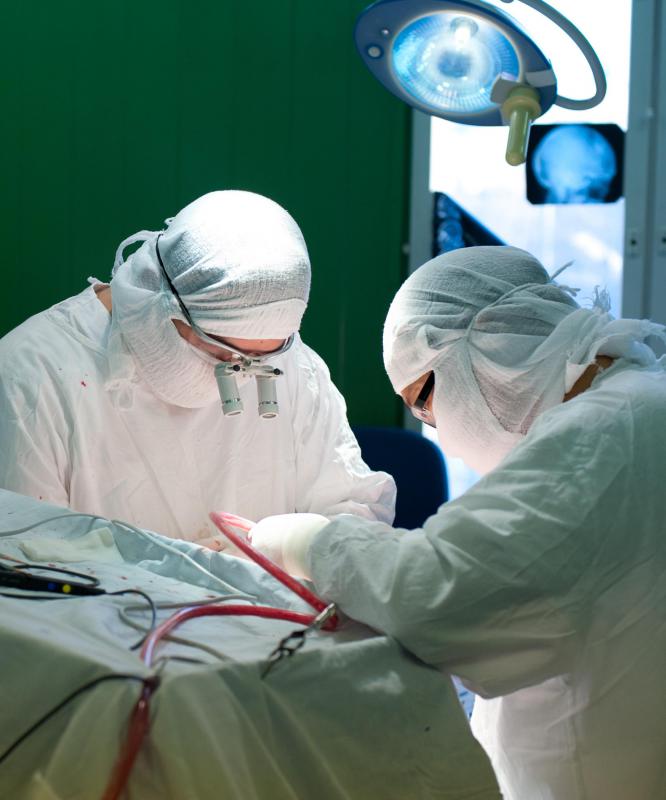At TheHealthBoard, we're committed to delivering accurate, trustworthy information. Our expert-authored content is rigorously fact-checked and sourced from credible authorities. Discover how we uphold the highest standards in providing you with reliable knowledge.
What Are the Best Tips for Recovering from Brain Surgery?
People recovering from brain surgery can pay attention to their post-surgery symptoms, find a new hairstyle, and resist the urge to itch their heads while healing. It is important for patients to report severe headaches or other unusual side effects of surgery to a nurse or doctor. The symptoms might just be part of the healing process, or they could be something a doctor needs to check on immediately. In addition, some people recovering from brain surgery have had their heads shaved and can find comfort in playing with new hair styles and buying wigs. After the pain has subsided and any necessary therapy is concluded, perhaps the hardest part of recovering from brain surgery is not itching the surgery site, which can disturb the stitches.
In some cases, the patient is not given heavy painkillers when recovering from brain surgery. The brain surgeon needs to know if the patient is experiencing severe headaches, which might indicate that the brain is swelling too much. Having a headache is normal, but if the headache worsens, a health professional should be contacted right away. The patient needs to rest and will usually have a moderate amount of painkillers to aid in resting, but he or she should pay attention to signs of worsening health. Severe pains should never be dismissed as part of the healing process unless a health professional says so.

It is common for brain surgery patients to have their head shaved before the surgery. Depending on how long the patient likes his or her hair, regaining normal length can take months or years. In the meantime, new hairstyles can be explored, or wigs can be used. Wigs of low to average quality that do not last for years can be bought relatively cheaply. The last thing someone needs when recovering from brain surgery is being embarrassed by the state of his or her hair, so a patient should take full advantage of the situation.

General fatigue or dizziness and itchiness at the incision site are common problems when recovering from brain surgery. These are usually normal and part of the healing process. Patients should try to refrain from excessively itching their scalp to avoid irritating the wound. Caregivers, family, and friends can help by understanding that brain surgery patients often experience fatigue and dizziness for weeks to months after the surgery. They may not have energy for activities they once did for some time.

Lastly, patience is key to fully recovering from brain surgery. The hospital stay normally lasts three days at minimum, but one week or more is not unusual, depending on the surgery. Brain surgery patients are generally advised to rest; anything that might cause undue stress or pressure on the brain is highly discouraged. Nurses help the patient flex his or her limbs to avoid stiffness when being confined to a hospital bed. Finding a hobby, talking to friends, or just sleeping can help the stay speed by.
AS FEATURED ON:
AS FEATURED ON:
















Discussion Comments
Itching is the sensation. We scratch to relieve an itch. Proper communication is important.
@spotiche5- That is a very good point, because brain surgery can be traumatic in so many ways. In addition to dealing with changes in appearance, many people have to face feeling uncomfortable or sick for a long time, losing various sensations, or even having to relearn certain tasks.
People facing brain surgery do not have to face these uncomfortable post-op side effects alone. Many communities offer support groups where patients can find advice, comfort, and new friends. Hospital staff members can direct brain surgery patients to the best resources for getting involved in such support groups.
Since having brain surgery is stressful and the recovery process can be lengthy, it is best for patients to explore their options for wigs before they have their procedures. This will relieve the stress and pressure of trying to find the right wigs during the recovery period when many people simply want to rest.
Post your comments